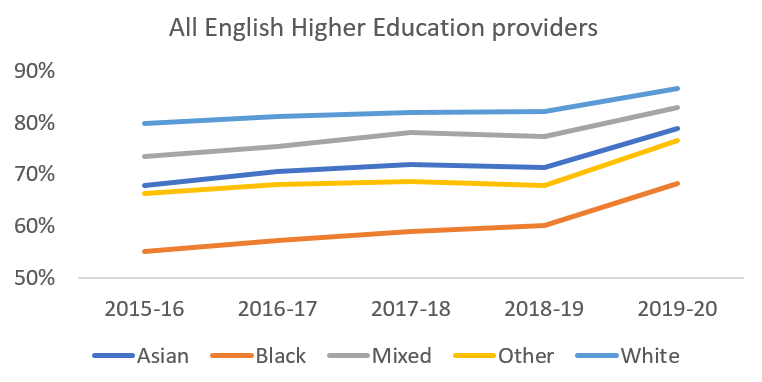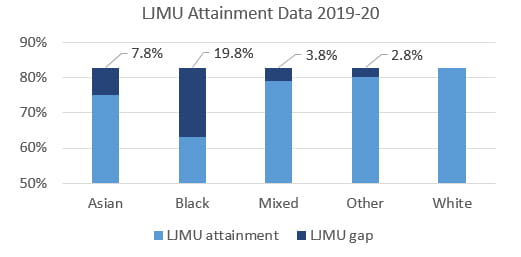Bridge the Gap
What is the degree awarding gap?
The degree awarding gap, sometimes called the attainment gap, is the difference between the percentage UK Black, Asian, and Minority Ethnic and White students who are awarded a first or 2:1 degree.
The latest 5-year dataset from the Office for Students, for all English Higher Education (HE) providers, highlights the variable yet persistent nature of the attainment gap. In 2015-16, 81.1% of White students were awarded a first or 2:1, compared to 57.3% of Black students, revealing a gap of 23.8 percentage points (pp). While this gap has shown a decrease to 18.4 pp in 2019-20, a significant gap remains.

How does LJMU compare to the rest of the UK?
Liverpool John Moores University is no exception to the HE sector. Our awarding gap is also significant and persistent.
The following bar chart shows LJMU degree awards, by ethnicity, for 2019-20. The data shows that 83% of White students were awarded a 1st Class or 2:1 degree, compared to 75% of Asian students, 63% of Black students, 79% of mixed race students and 80% of other ethnicity students.

What are LJMU doing about it?
To understand the factors behind the awarding gap at LJMU, an inter-departmental council (The Attainment Gap Council) has been created. Through this, a project team has been assembled, comprised of academic staff, institutional researchers, and importantly, current LJMU students have been employed as student-researchers. The outcomes of this project will be a toolkit of interventions and resources aimed at closing the awarding gap.
There are four main elements to the project:
Faq Items
How can you be involved?
- If you are a member of LJMU staff who would like to be involved or know more about this research, please contact Dr. Elena Zaitseva (e.zitseva@ljmu.ac.uk).
- If you are an LJMU student who would like to be involved or know more about this research, please contact Dr. Emma Smith (e.l.smith@ljmu.ac.uk).
Meet the team

From top-left to bottom-right: Anna John, Atif Waraich, Loredana Frau, Kat Gibby, Mwaka Nanyangwe, Deshan Premasiri, Elena Zaitseva, Ana Galdamez Pesantes, Reda Madroumi, Phil Carey, Shivaan Ghaderi, Olatunde Durowoju, Nina Pal, Emma Smith. Colleague not pictured: Mashal Safi.

